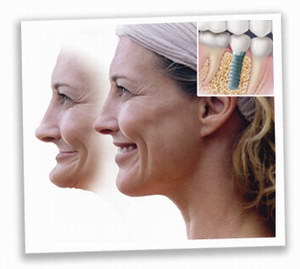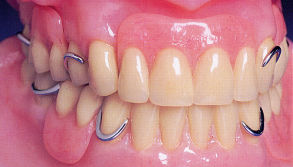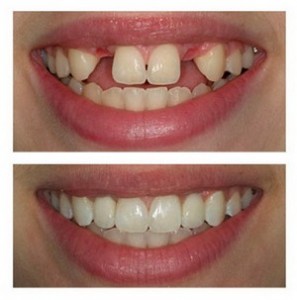Dental implants pros and cons

Currently, the installation of dental implants is becoming more popular, gradually replacing traditional dental prosthetics.
The problem of lack of teeth can affect every person, and it is very important to immediately restore the functions of the teeth, because if you do not do it on time, then their absence can lead to a change in appearance and provoke various diseases.
Therefore, people who have lost teeth need to make the right choice between implantation and the traditional installation of dentures.
The need for tooth restoration is dictated by the following reasons:
- A change in the position of the teeth relative to the adjacent ones (the gap between the teeth increases, the teeth can turn around). At the same time, the smile deteriorates and the functions of the maxillofacial joint are impaired.
- The bite changes, leading to pathological abrasion of the teeth.
- With the loss of fangs and sixes, retraction of the tongue of the soft palate can occur, which can cause snoring and even temporary respiratory arrest - apnea.
- Impaired chewing function can cause diseases of the human digestive system.
- The presence of defects of diction.
- Change in appearance: the formation of wrinkles around the nose and mouth, the lowered corners of the lips, the change in the shape of the face.
- Nervous disorders due to the fact that a person feels inferior.
To avoid such detrimental health effects, it is necessary to restore lost teeth in time.
Teeth restoration should be as effective as possible.
Implantation helps to solve any problems, and first of all aesthetic ones related to the loss of teeth.
After carefully weighing the pros and cons of implant placement, many patients choose traditional prosthetics.
The reason for this choice is most often the lack of finances, the fear of dental procedures, as well as the presence of contraindications and restrictions on implantation.
Disadvantages of prosthetics

- When installing bridges, depulpation and turning of adjacent healthy teeth is required, which after some time begin to decay and the prosthesis has to be installed on the following abutment teeth.
- Particles of food can fall under fixed prostheses, which leads to the appearance of halitosis and the development of dental caries established under the bridge. Caries can only be cured after the prosthesis has been removed.
- Atrophy of bone tissue in the place of the missing tooth. As a result of its thinning, in people without teeth, facial features change.
- Hypoxia of the gum tissue, in connection with the pressure on her denture. Prolonged use of prostheses can cause severe bone atrophy, which can reach the trigeminal nerve canal and cause pain when chewing food.
Dental implants: the pros and cons
Consider the arguments for the installation of implants:
- Longevity of dental implants. High-quality dental implants will serve their master for one or more decades.
- People who have installed dental implants experience complete comfort when communicating with others, I have the opportunity to take the usual food.
- When one or more implants are implanted, the installation of the prosthesis does not require grinding of adjacent teeth.
- Implants externally are no different from real teeth. They look beautiful and aesthetically pleasing.
- Care of implants comes down to the usual hygienic brushing of teeth.

Photo: Implantation before and after - When implants are installed, there is no sensation of the presence of a foreign body in the mouth, the taste perception is not disturbed, which, in turn, makes the chewing process more natural.
- It has no restrictions on the number of implants to be implanted.
- Quick solution to the problem of complete lack of teeth.
- The implanted implant takes on the entire load of the lost tooth, while unloading adjacent teeth.
- Implantation is the most effective method to combat bone loss.
- Changing the gingival margin and exposing the crown are minimized. Preserving aesthetics for a longer period.
- Reliable fixation of crowns on the implant and the ability to withstand heavy loads.
- Some types of implants can stimulate bone growth.
- In case of destruction of teeth adjacent to implants, it is possible to use previously installed structures for prosthetics.
- The crown on the implant can always be replaced.
- Restoring the functioning of the dentition.
- During implantation, the number of visits to the dentist is minimized.
- The presence of a large number of implantation techniques allows you to choose the one that is more suitable for the patient.
- High percentage of implant survival.
- Ease of use. There is no need to remove implants for hygiene.
Arguments indicating the disadvantages of implantation:
- The installation of implants is an surgical intervention that causes unpleasant painful sensations that create a load on the body at the time of its implementation and in the postoperative period. Compared with some types of prosthetics, the implant implantation procedure is more traumatic.
- The possibility of complications in the postoperative period during implantation.
- The presence of contraindications for the operation.
- With a lack of bone tissue, before surgery, it often needs to be built up, which can be painful for the patient.
- Duration of implant fusion with bone tissue.
- Dental implants are more expensive than classical prosthetics. In fact, there is not much difference, because when implanting the patient, the entire amount is voiced immediately, and when prosthetics, services are paid in stages. With prosthetics, there are more expenses than with implantation. Given the fact that the prosthesis lasts an average of five years, the cost of prosthetics will constantly increase.
- Implants are not eternal designs, like everything natural. The manufacturers promise the implant a long life, but the titanium root installation technique and proper care play an important role.
The civilized world has opted for implantation.
In developed countries, dental implantation is a fairly common way to restore teeth. In the USA, Israel, countries of Western Europe, there is a law that, before conducting any treatment, the dentist must offer the patient dental implantation.